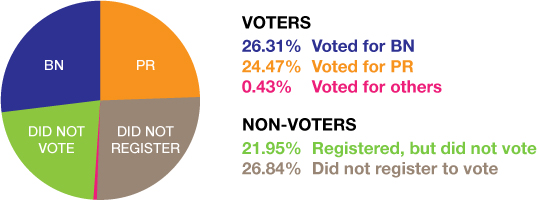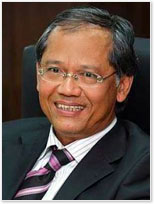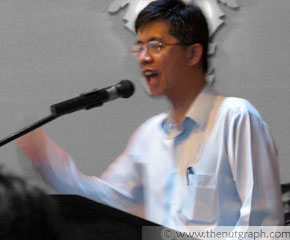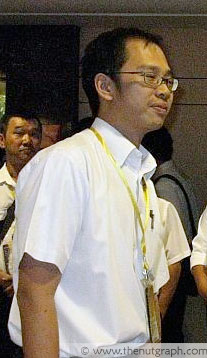IF rumour holds true, the 13th general election, due by March 2013, will be held sometime this year. Once again, Malaysians will cast their votes and the party that wins the most number of parliamentary seats will govern federally.
But how legitimate is the government that eventually gets into power? Does the party in power actually have the support of a majority of Malaysians? And if not, what can be done to make our democracy better?
8 March results
Let’s look at Malaysia’s 12th general election, held on 8 March 2008. Of the 10.9 million registered voters, about 70% cast their ballots. Barisan Nasional (BN) won 51.39% of those votes and took 140 out of 222 parliamentary seats. Pakatan Rakyat (PR) took 47.79% of the votes and 82 parliamentary seats.
However, about 30% of the 10.9 million registered voters did not vote. If we take them into account, BN only has the support of 35.97% of all registered voters, and PR 33.45%.
If we include the approximately four million Malaysians of voting age who did not register to vote, BN’s actual support drops to only 26.31%. PR’s support would be only 24.47%.

What does this say of the legitimacy of the BN government’s right to wield political power? Indeed, the number of Malaysians who did not register to vote constitutes 26.84% of all those eligible to vote. So each of the two political coalitions won less popular support than the total number of Malaysians aged 21 and above who did not register to vote.
DBKL representation

The running of the Federal Territory of Kuala Lumpur is a good example of where the legitimacy of government can be questioned. Although PR won 10 out of 11 parliamentary seats in Kuala Lumpur, no PR representative sits on Dewan Bandaraya Kuala Lumpur’s (DBKL) advisory board. This board has been appointed by the federal government since the city of Kuala Lumpur was established in 1972.
None of the present 13 advisory board members has any popular mandate from the people of Kuala Lumpur to advise the Datuk Bandar in running the city’s administration. For that matter, neither does the Datuk Bandar, as he is also a federal government appointee.

Datuk Lim Si Pin of Gerakan is the only advisory board member who contested in Kuala Lumpur in the 2008 elections. He obtained 20,330 votes in the Batu seat, where he lost to Parti Keadilan Rakyat’s Tian Chua. This constitutes 4.08% of total votes cast throughout Kuala Lumpur. With only the support of 4.08% of Kuala Lumpur, Lim is nonetheless able to exert influence on the governance of Kuala Lumpur citizens in a way that none of the elected PR representatives can.
Overall, of the 497,741 votes successfully[1] cast for all candidates in the 11 Kuala Lumpur parliamentary constituencies, PR obtained 308,377 while BN secured 188,875. In terms of percentage, PR gained the support of about 62% of voting KL-ites as opposed to BN’s 38%.
In the light of these statistics, the BN’s complete control of the administration of Kuala Lumpur is a travesty of democracy and flies in the face of the declared intent of its voting citizenry.
Return local government elections
One sure way to ensure better representation would be to reinstate local government elections.

To be fair, Lim has said that even he, as an advisory board member, is scantly respected by DBKL staff. Speaking at a 10 Feb 2012 Centre for Public Policy Studies forum on the next general election and its impact, he said DBKL staff recognise the anomaly of his situation and fail to pay him any heed. He has thus repeated his party’s own call for the return of local government elections, the only BN component party to have done so.
The reason may be two-fold. Gerakan could genuinely believe in local democracy. After all, it has its origins in the streets and neighbourhoods of Penang, and its support of local democracy may hark back to halcyon days of its glorious past. Reintroducing local government elections may also be the only way the party can stave off complete annihilation as a political entity in this country.
The return of local government elections was part of PR’s manifesto in 2008, and is likely to remain so for the next general election. Since coming to power in Selangor and Penang, both state governments have launched initiatives in that direction. Penang briefly experimented with a selection exercise with civil society participation to choose potential candidates for appointment as local councillors, but then failed to appoint all the successful candidates. Rather than proceed on its own, the Penang government has announced it will take legal action against the Election Commission to force it to conduct local government elections.
The Election Commission has parroted the federal government’s position that local government elections, suspended in 1965 and totally abolished in 1976, cannot be brought back without fresh legislation in Parliament. Both Penang and Selangor take a different view of the legal position. In fact the Selangor government announced the use of elections to choose 30% of the Majlis Bandaraya Petaling Jaya’s members as an initial experiment. However, such elections will now take place only after the next general election, widely expected this year.
Both BN and PR should pay much closer attention to local government elections. It has a hidden appeal that goes beyond mere participation in local politics. If the Malaysian public decides it likes the idea of separating political power between federal and state government, it may well pursue the same in state and local government relations. The political coalition that ends up losing a state election could nonetheless remain relevant if it were to win seats contested in local government elections, if the latter were reintroduced. This would prevent a total shut-out from government and allow it to continue to wield political power and influence. ![]()
Andrew Khoo is an advocate and solicitor in private practice, and an aspiring columnist and commentator.
[1] Excluding spoilt votes and ballot papers not returned. Figures taken from the website of the Election Commission.


stewoolf says
Totally agree we need local elections. The Asean governments have been described as “semi-authoritative” by an NPR (U.S. public radio) guest. So, how legitimate?? The most critical factor is election resources. For example, where did BN get their campaign fund?? Secondly, media access. The pro-opposition news are non-existent in the MSM. Thirdly, how representative?? While spending billions on KL MRT, KK town does not even have ONE running bus company. Why not replace the upper house with an elected senate representing state and regional interests?
Andrew Khoo says
Dear stewoolf,
As you may know, the Senate is mmade up of 70 members of which 30 represent the states and federal territories. These are chosen by the states – 2 from each state elected by the state legislative assembly (so 26 altogether), and 4 appointed by the Yang diPertuan Agong for the federal territories of Kuala Lumpur (2), Labuan (1) and Putrajaya (1).
The remaining 40 are chosen from among those who have distinguished themselves in public service, the professions, commerce and industry, etc. and to represent minorities and Orang Asli. This is set out in Article 45 of the Federal Constitution.
The Federal Constitution also provides for the possibility that there can be 3 senators from each state, and for these to be directly elected by voters in the state. There is also provision that the number of appointed members be reduced, or abolished.
stewoolf says
Thanks, Andrew. Great education. I admit to know more about Mitt Romney than Najib. However, the Senate is non-functioning and NOT legitimate, the Senators represent those who appointed them, regardless of what the Constitution says. Bottomline, what is the impact of the Senate on politics and the People?? Nothing. None. Zero.
ellese says
[…] As long as its [compliant] with the law it’s legit. No two ways. Where did [the writer] do his law? If want to spin for PR, at least be intellectual sikit. People [are] not stupid and don’t want to be fooled.
Andrew Khoo says
Dear ellese,
There are several jurisdictions that provide in their laws that an election shall not be valid unless a certain percentage of the electorate vote. The percentage mostly used is 50%. Looking back at the 2008 general election, the number of those who cast votes as a percentage of all Malaysians eligible to register as voters was 51.21%.
However, legitimacy is not merely a question of compliance with law, and even then we need to assess the quality of the law and the integrity of the vote. It is also about whether the result represents the will of the electorate. If we look at the government of Kuala Lumpur, then I do believe that serious questions must be asked – why can’t Kuala Lumpur have a local government that reflects the electoral intentions of its voters?
This is not a question of favouring one political coalition over another. Having local government elections will benefit both political coalitions. But more importantly, it will allow the rakyat to have the local government that it wants. Surely listening to the will of the people is the ultimate test of legitimacy.
Guan Sin aka Pratamad says
ellese,
Your understanding of “legit” is rather shallow and naive. Legitimacy here refers to whether the governance of DBKL is convincing enough to the people and from a democratic point of view. Obviously, with all the political appointees from Putrajaya to run DBKL, the interests and voice of KL people can hardly be heeded at all. Plain and simple concept here.
Gopal Raj Kumar says
Legitimacy in the context of representative government, universal franchise and the power relationship is an exercise in futility. At the core of this and other arguments like it that from time to time rear their ugly heads, is that ill-defined concept without definition that we often refer to as democracy.
Legitimacy of any government is not simply recognition by the majority of its citizens. Because amongst any population are those who are ineligible to vote or those, although eligible to vote, do not exercise that right. There are those who vote against or for a purpose and a cause not wide enough to fit into the larger scope of broader policy initiatives.
Leaving this aspect of the problem aside is the more powerful and compelling force of international relations and the component states that dominate it for a government to have to contend with for legitimacy.
In the early part of this decade, Algerians overwhelmingly elected an Islamic government in their general election. It had as one would say legitimacy at the local level. However this was not the case at the international level. With the express support of the US, France and other European states, the military moved in and displaced the Islamic government. Legitimacy?
In an apparent show of “people power” in 2011, the Egyptians displaced an elected government, however unpopular it was said to be. Legitimacy is yet to be bestowed on the successors to Mubarak, caution being the reason at the international level at least.
In 2004, the US overthrew the government of Saddam Hussein, a government in power and recognised with as much support as was required under its constitution. The overthrow we now know was illegal as was the war under international law.
In each of these few examples is the question of legitimacy and its paradoxes. How could the will of a people be illegitimate in such circumstances? Legitimacy is as elusive a concept today as democracy is. Till we are able to define these concepts.
Andrew Khoo says
Dear Gopal,
You certainly raise valid questions regarding geopolitical issues and international relations, which were outside the ambit of the article, which was more focused on domestic politics and, in particular, local government.
However elusive the concept of legitimacy may be, depending on the context in which it is considered, the appeal to legitimacy is one that all governments seek to make, regardless of system of democracy or governing political thought. Like the holy grail, elusivity has not prevented or diminished the pursuit of governmental legitimacy.
Gopal Raj Kumar says
You failed to define the meaning of legitimacy of government as a concept at the outset. There is no defined reference to the concept as you present it. Therefore, the universally accepted definition would be a good starting point for me to base my response to your article on that, for want of a better expression or word, is ‘legitimate’.
To suggest now that what I have placed before you in response to your article is “outside the ambit” of your arguments or proposition is to attempt to correct significant defects in your original position retrospectively. That I am afraid does not cure the defects in your argument nor lend legitimacy to the claims and assertions you make therein. It is not a valid rebuttal.
Are you suggesting there are different degrees or meanings to “legitimacy of government”? Even if that’s in reference to the Malaysian government? Or do you suggest that Malaysia is a special case and its problems and issues remain in a vacuum and must be dealt with in that vacuum in isolation from the rest of the world and reality?
ellese says
Andrew,
You questioned the legitimacy of our government be it BN and PR. [The] issue is not legitimacy because it’s legitimate. For those who do not vote, please note that under any democratic practice which does not impose mandatory voting, one has a right not to vote. So if it’s around 50% votes it’s still legitimate as such democractic practice recognises the right not to participate and not to vote. So unless you’re proposing mandatory voting, it is legit [which]ever definition you want to use.